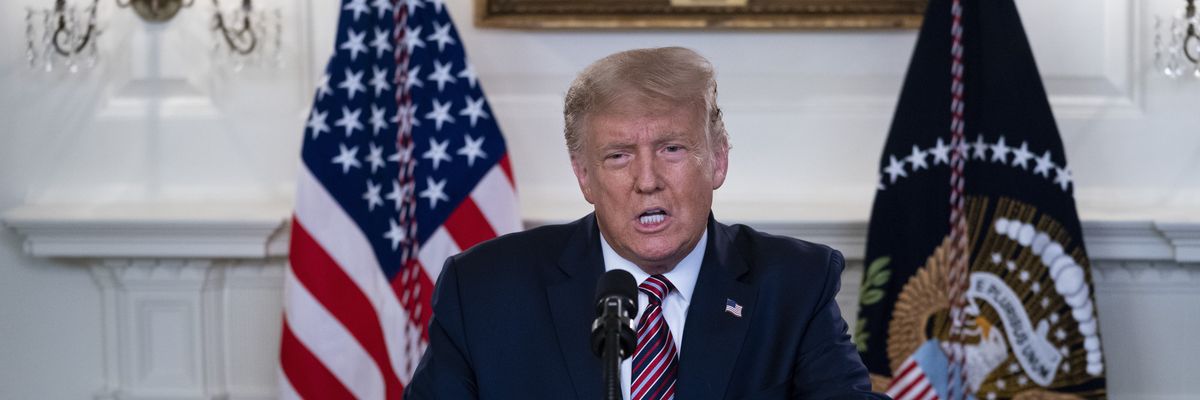Right-wing Chief Justice John Roberts accused his liberal colleagues on the U.S. Supreme Court of "fearmongering on the basis of extreme hypotheticals" in their alarmed dissents against the conservative supermajority's ruling in Trump v. United States, which held that current and former presidents are entitled to sweeping immunity from criminal prosecution for so-called "official acts."
But legal experts said in response to the decision that the "nightmare" scenarios Justice Sonia Sotomayor outlined in her dissent—including a president ordering the Navy's SEAL Team 6 to assassinate a domestic political opponent or staging a coup to remain in power, all without legal consequences—aren't farfetched readings of the new ruling.
"The language of the Supreme Court's decision seems to suggest that because this is a core function of the president, that there is absolute immunity from criminal prosecution," Cheryl Bader, a criminal law professor at Fordham Law School and a former federal prosecutor, toldPolitico. "If [presumptive GOP presidential nominee Donald] Trump, as commander-in-chief, ordered his troops to assassinate somebody or stage a coup, that would seem to fall within the absolute immunity provision of the court's decision."
"If brazenly attempting to overturn a democratic election by claiming the powers of the presidency can be a so-called 'official' act of the president, then where does it end?"
Bader was hardly alone in her interpretation of the ruling, which Trump and the far-right architects of his possible second White House term celebrated as a critical victory in their effort to seize the levers of the federal government.
"If I'm reading the court correctly," Cornell Law School professor Michael Dorf wrote on social media after the decision was released Monday, a president "can openly accept bribes for pardons, because those fall within his 'exclusive' authority."
During oral arguments over the case in April, an attorney for Trump conceded in response to questioning from Sotomayor that assassination of a political rival "could well be an official act"—thus making it unprosecutable under Trump v. United States.
Orin Kerr, a law professor at the University of California, Berkeley, warned that if Trump wins another term, he's "going to preface every blatantly illegal thing he does by saying, 'Official act, this is an official act.'"
Analysts, lawmakers, and civil liberties groups alike expressed horror at the prospect of a former president who has openly threatened to target his political opponents taking office with king-like powers bestowed by the Supreme Court's conservative majority—half of which Trump appointed.
"Former President Trump's handpicked justices have cast aside our nation's bedrock principle of the rule of law, afforded future presidents carte blanche to abuse the powers of their office for political and personal gain, and laid the foundation for Donald Trump to have absolute authority in a potential second term," Sen. Alex Padilla (D-Calif.) said Monday.
"If brazenly attempting to overturn a democratic election by claiming the powers of the presidency can be a so-called 'official' act of the president, then where does it end?" he continued. "If a former president who has fomented an insurrection at our Capitol and who now promises to serve as a dictator on day one back in office can avoid accountability in a court of law, then as Justice Sotomayor stated, I too 'fear for our democracy.'"
ACLU national legal director David Cole warned that the Supreme Court supermajority's opinion "sits like a loaded weapon for Trump to abuse in the pursuit of criminal ends if he is reelected."
In a column headlined "The President Can Now Assassinate You, Officially," The Nation's Elie Mystal wrote that he "cannot even imagine what [Trump will] try if he is actually given power again, knowing full well that he will never be held accountable for literal crimes."
"Under this new standard, a president can go on a four-to-eight-year crime spree, steal all the money and murder all the people they can get their hands on, all under the guise of presumptive 'official' behavior, and then retire from public life, never to be held accountable for their crimes while in office," Mystal noted. "That, according to the court, is what the Constitution requires."
"While the Supreme Court says 'unofficial' acts are still prosecutable, the court has left nearly no sphere in which the president can be said to be acting 'unofficially,'" he added. "And more importantly, the court has left virtually no vector of evidence that can be deployed against a president to prove that their acts were 'unofficial.'"

